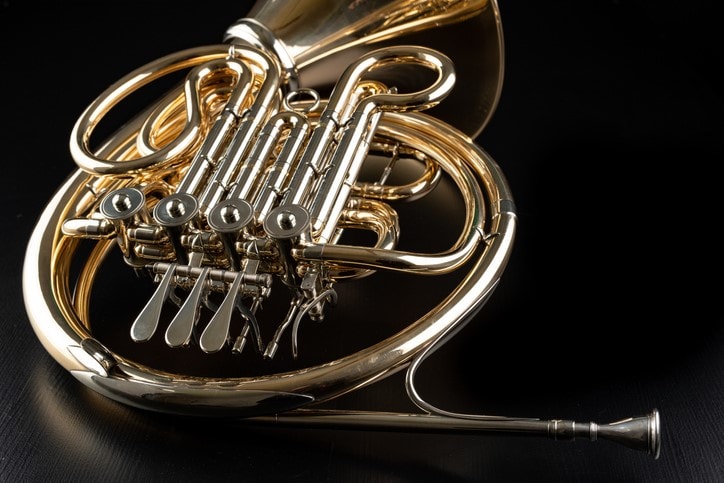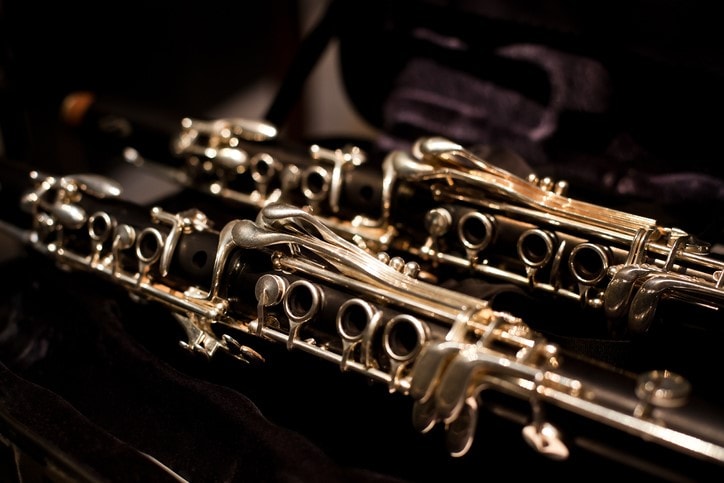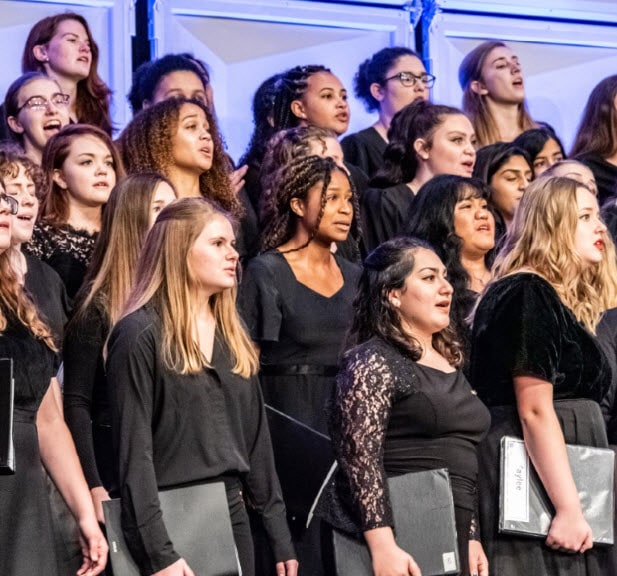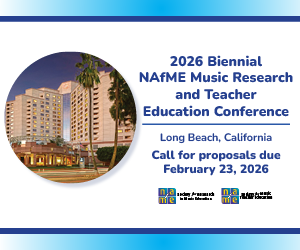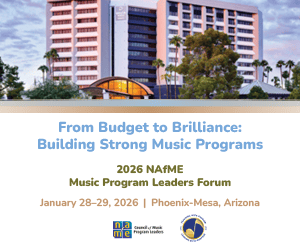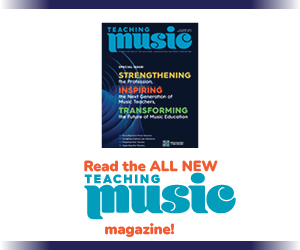/ News Posts / The Students’ Voice during the COVID-19 Disruption (Part 1 of 2)
The Students’ Voice during the COVID-19 Disruption (Part 1 of 2)
“I’ll Miss Having My Second Family”
By NAfME Member Scott N. Edgar
We, as music teachers, have been tasked to do the impossible: Take an artform that is highly emotional and social and put it online in a similar way to that which we do so well in person. So much of the current discussion is about how to make our online work look like what we do in person. Not only is this impossible to replicate, it is missing an opportunity to capitalize on this unique situation. I have been heartened to see many teachers reaching out to their students and giving them a space to be together, to talk, and bond in a familiar way. This is a necessary component of honoring the students’ voices and needs.
I have had the honor of getting to know many high school music students and their teachers this year as we have been implementing Social-Emotional Learning/Music curricula. When this COVID-19 disruption occurred, we began discussing how the students are feeling during this process and how best to support them. Through their responses, we are learning a great deal about their current mindset and how they are responding to the situation1. The voices of 150 high school band and choir students from multiple schools are represented in these conclusions, spread across all grade- and ensemble-levels.
The Students Love Their Music Classes
Overwhelmingly, the students are longing for and mourning the loss of their music classes in the way they are familiar. This stems from social and musical experiences that cannot be replicated online.
Band means being able to see my friends every day, it means getting out if my head and just playing the music. It means having a family through every mistake, small or big.
Band rehearsal provides a unique and beautiful opportunity to be not only surrounded by, but also contribute to the creation of extraordinary sounds every day. I’m going to miss those moments where everyone lines up and blends perfectly and there’s a sort of magical feeling as people realize how well that part was played.
Band is literally my entire life, and I don’t know what to do without it.
Band has vastly changed me for the better and I have made my best friends through band. I am not sure if I am continuing band in college, so knowing that my last performances and rehearsals ever might have already passed is devastating.
Band is a time of the day where I’m able to separate my mind from every other stressful thing going on in school and to focus on music which relaxes me. I will miss having that designated time of day to focus on my music.
I’ve met all my best friends and made amazing memories through music ensembles. Being in band was the only motivation keeping me away from senioritis so now I’m just sad and bored.
Choir is my time to be free. Choir is my everyday reminder that music is important to me and it’s more than just a sound. Choir lets me breathe. It lets me release everything I’ve built up throughout the school day. It’s my passion, and I think the only thing I’m missing from school is my ensemble.
Choir is the thing that keeps my life steady, it’s something that doesn’t change.
Choir is a place of security where I can forget about my current problems and focus on making music. It’s a place of comfort and familiarity.
I’ll miss having my second family; they were the people I went to when things were rough at home and now I have nowhere to go, yet they’re still reaching out to me.
Band means everything to me because it has saved my life.
Most Students Are Struggling with the Cancellations and Changes, But Not All
The predominant opinion was that of extreme disappointment that events were being cancelled; however, some students expressed relief that they could now focus on different priorities. Most students had perspective and understood it as a necessary precaution. Teachers should consider this wide range of emotions when interacting with their students.
Some students were very disappointed:
I’m heartbroken; I was looking forward to events, and when I heard they were being postponed, I was really sad. I had already begun the week terribly, and the concert was the one thing I was looking forward to.
It’s really upsetting because these events are what we build up to through the school year. Especially with band fest: that is an event that we get to work with the younger students, and they can see what they can become if they work hard and practice. I have been talking to friends, and we’ve just been supporting each other through it.
Honestly, I’m not dealing with it in the best way. I’m just letting myself feel out the sadness and disappointment and letting myself gradually feel okay again.
If I’m being perfectly honest, crying a lot.
I am pretty bummed. Realistically there is a good chance that our concert in April, my last one because I am a senior, will get cancelled. The entire thing (the virus, no school, cancelling) is so surreal. It hasn’t fully sunken in yet.
I’m really sad, and I’ve been talking to many of my band friends about how they feel too. Everyone is disappointed and sad, but maybe (hopefully) we’ll still be able to have this program at our spring concert. There are a lot of people who feel like our hard work is now for nothing, especially seniors who now won’t get the chance to play this final concert with wind ensemble. So, it’s best that we make the most of the situation and try to deliver an amazing spring concert if that still happens. If not, this time off will be a good chance to personally improve and prep audition materials and personal music goals.
Some students understood with mixed emotions:
I am kinda sad, but a bit relaxed mostly because I get very anxious with many students I don’t know and hope they don’t make fun of me.
I’m pretty sad, but I just keep reminding myself that it’s for our safety.
I am really disappointed. I loved the pieces we were playing, and I was really excited to share that with an audience. I am also relieved, because I know it would have been stressful to get it together so fast.
I am fine with that (the cancellations), but more scared about the virus than anything else right now.
Some students were not disappointed:
I have been trying to do music in another way. So lately, I’ve been practicing guitar more because music class isn’t available.
I am taking the extra time to take better care of myself both physically and mentally/emotionally.
I think the cancellation of concerts and performances isn’t all that bad. I already have lots of things to do weekly, and that was just another thing that needed to be done.
I’m actually okay with it because it takes some pressure off.
Regardless of perspective, this disruption has affected students’ mindset and routine. These changes and cancellations will continue to define our music students’ memories and perceptions of their school music experience. We must model and frame these disappointments in as positive of a light as possible. Negotiating refusal (being told no) is an essential life skill. We can use this as a teachable moment on how to navigate disappointment with grace and realizing this is out of all of our control.
What We Can We Learn from Our Students
- This is just as big of an adjustment for our students as it is for us, as teachers. They are navigating challenges of losing their peer connection, social circles, organizational structure to their day, mentors, and routine. We need to lead with empathy as we attempt to instruct our students remotely. While we are unable to authentically replicate the musical performance of our ensembles, we can continue to nourish our students socially and emotionally.
- Each of our students are unique and have varied opinions and perspectives about the disruption, cancellations, taking ownership of their own learning, and developing independence. Understanding this spectrum of emotions, and allowing space where all voices are valued is essential to continuing to reach our students.
- Our students miss us and our music classes! Reach out them to reassure them that we are still here and we miss them too!
Stay tuned for Part 2 of 2 where I will share how students are learning to work independently and adjusting to more unstructured time.
[1] All data is anonymous and this research was approved as ethical by the Lake Forest College Human Subjects Review Board and the participating school districts.
About the author:
Dr. Scott N. Edgar is in his eighth year as Associate Professor of Music, Music Education Chair, and Director of Bands at Lake Forest College. He received his Doctorate of Philosophy in Music Education from the University of Michigan, his Masters degree in Education from the University of Dayton, and his Bachelor of Music in Music Education degree from Bowling Green State University. Prior to his work in higher education he taught K-12 instrumental music in Ohio and Michigan. Dr. Edgar is the author of Music Education and Social Emotional Learning: The Heart of Teaching Music and is an internationally sought-after clinician on the topic. In addition to clinics, he also teaches graduate courses on Musical Social-Emotional Learning at VanderCook College of Music. Dr. Edgar is a Conn-Selmer Educational Clinician and VH1 Save the Music Foundation Educational Consultant. Dr. Edgar is a member of the National Association for Music Education, the American Educational Research Association, the College Music Society, Phi Mu Alpha Sinfonia Music fraternity and Kappa Kappa Psi Band fraternity. He lives in Lake Villa with his wife Steph, their son Nathan, and their cats Elsa and Wolfie.
Did this article spur new ideas for your music program? Share them on Amplify! Interested in reprinting this article? Please review the reprint guidelines.
The National Association for Music Education (NAfME) provides a number of forums for the sharing of information and opinion, including blogs and postings on our website, articles and columns in our magazines and journals, and postings to our Amplify member portal. Unless specifically noted, the views expressed in these media do not necessarily represent the policy or views of the Association, its officers, or its employees.
Catherina Hurlburt, Marketing Communications Manager. March 24, 2020. © National Association for Music Education (NAfME.org)
Published Date
March 24, 2020
Category
- Uncategorized
Copyright
March 24, 2020. © National Association for Music Education (NAfME.org)
